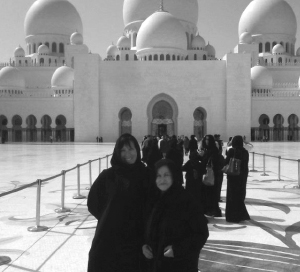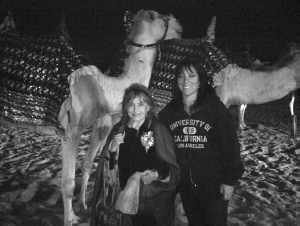Don't Tell Me I Can't Do It! (8 page)
Read Don't Tell Me I Can't Do It! Online
Authors: Erica Miller

Much later in life, when my father died, I requested an open casket, determined once more to stare willfully and defiantly into the face of death. But when I saw his lifeless body lying there, all made up like a grotesque mannequin, I went to pieces. The pain of my cumulative losses rose unbidden to the surface, and I cried unabashedly for all of the cruelty I had witnessed toward my father in the war. I cried for the hundreds
of dead people I had seen in the camps. I finally cried for Aaron, too. I sobbed shamelessly, wondering whether the flood of my tears would ever dry up. Such an emotional display was so out of character for me, but somehow my father’s death opened the floodgates of years of pent-up grief.
In the aftermath, I learned to appreciate another important life lesson:
Hurt brings opportunity for growth and healing. Cherish it all.
As my readers are undoubtedly aware by now, I don’t enjoy feeling vulnerable or out of control. I make concerted efforts to avoid situations that jeopardize my emotional placidity. In the past I have erected some formidable inward barriers against the unsettling possibility of being hurt—my illusory attempt to maintain complete control over the tempestuous thing that is the human heart. Nevertheless, I’ve been confronted time and time again by the woes of this world and the evils of human nature. I’ve been forced to admit my human frailty and to succumb to the weight of sorrow. I still resist displaying my emotional vulnerability openly, but I’ve learned not to resist the onslaught of anger and sadness (or of joy, for
that matter). I’ve come to see that, like everything else in life, the unpleasant feelings we experience in the aftermath of hurt are gifts. Received with gratitude, these emotions help us embrace new opportunities for growth and healing so that we can emerge stronger on the other side of our trials.
That’s not to say that I invite or look forward to misfortune, exactly. But when the hardships and the suffering come, as in this world they most certainly must, I find that I’m far less out of control than I fear precisely
because
I hurt. Far from being weakened, I find that I’m actually strengthened by personal trauma in the long run, and that makes enduring the short-term unpleasantness of it all worthwhile. I don’t really think it’s the hurt itself that we should be worried about. It’s the vanity of imagining we never
have
to be hurt that really gets us into trouble.

It took a lot of persuading before my parents finally agreed to follow their daughters to America. Diana was six months old when they arrived, and my mother
eagerly took to her new role as a grandmother. I believe she was in heaven. I remember once, as I watched her tenderly clasping her granddaughter to her bosom, I caught a glimpse of wetness in Mama’s eyes. In the worst of times—and our family had endured some of the worst times imaginable—I had never seen my mother cry. But now, in this happy moment, displaced from the circumstances of my childhood by many years and many miles, the tears flowed freely.
I came to understand, as Mama attempted to apologize for the lack of affection she showed me as a young child, that her newfound relationship with her granddaughter was helping her get in touch with feelings of sadness and regret for a time irrevocably lost. As she experienced the overwhelming joy of holding Diana and surrendered to her repressed maternal instincts, she also mourned those missed opportunities for deeper, more personal relationships with her own children. Her confessions of regret touched me deeply. Looking back, I realize that I followed Mama’s example. Like her, I failed to be the nurturing mother Diana needed, and, like her, I only came to appreciate
this much later in life, after meeting my own grandchildren. It’s not that I regret having decided to be a working mother instead of a “mother” mother. I just wish I would have taken steps earlier in my relationship with Diana to prevent my ambitions from driving a wedge between us.
I watched as Mama courageously embraced her regrets and grew from them. When I later experienced the same regrets, I grew as well. I became more affectionate and found the courage to ask for forgiveness. I took steps to mend and thereby strengthen my relationships as a result of my decision to examine my grief rather than suppress it.
Now, when my feelings are hurt, I make sure that I do my part by expressing them in a responsible way and talking things through. You’re important; so am I. Everyone’s opinion matters; so does mine! I believe that it’s vitally important for us to air our feelings and to make ourselves heard when others injure us because, if we don’t, we leave the door of healing closed, and we pave the way for even more hurt. I’m not just talking about my penchant for being up-front about my
opinions, nor am I suggesting that we steamroll others with our unpleasant feelings whenever someone says or does something we don’t like. I’m talking about taking the initiative in being peacemakers—opening the door for reconciliation even before the other party has decided to ask for forgiveness, sometimes even before the other person realizes they’ve said or done something hurtful at all. This is especially important for our relationships with family and friends.
In many ways, Diana was a victim of a cyclical pattern of emotional detachment. She experienced from me the hurt that I experienced from my mother, who in turn modeled the same kind of parenting she experienced from her own mother. I can’t do anything that will undo the hurt that Diana experienced, just as Mama could do nothing to restore those forfeited opportunities with me. What I can do, however, is make sure that I pass on what I’ve learned to my grandchildren and to others who find themselves in similar situations. I can take that hurt and turn it into opportunities for healing.

Abu Dhabi, UAI, in February 2012 with my daughter in front of a historic Mosque. We had to put on black garments.

In Dubai (February 2012) with my daughter.
This is a principle I’ve tried to bring to my counseling approach, particularly with clients who are suffering as victims of domestic abuse. I’m particularly alert to women with relationship issues who have settled for abusive partners. Often, these women have had faulty attachments early in life that have led to their emotional withdrawal, poor communication skills, and apparent lack of entitlement to meaningful relationships. With such clients, I advocate a corrective perspective: No, it’s not okay to permit that kind of treatment, and yes, it
is
possible to find a loving partner you can trust. I see it as my calling to teach them self-respect and boundary management, empowering them to assert themselves and to resolve their relationship conflicts in an adultlike manner. Especially when these clients are victims of domestic violence, I see my work as an opportunity to “right” the wrongs I experienced back in the camps, where I witnessed firsthand the profound degradation to which human beings can subject one another.
I’ll never forget those Nazi soldiers grabbing my father and throwing him to the ground, viciously
beating him for no apparent reason whatsoever. (We called them the “joy” beatings, because their sole purpose seemed to be to gratify of the soldiers’ sadistic whims.) I remember the senseless panic I felt as I struggled to comprehend the scene before me. “Why? Why are they beating Papa like that? What did he do?” But there was nothing I could do to help him.
No child should bear witness to that kind of degradation. In my work as a mental health professional, I owned up to my responsibility to make good of that spectacle and countless others from my childhood. Time and time again, I’ve been able to help right the wrong done to my father. Over and over I’ve used my knowledge of that kind of hurt to help others find healing, and in the process I’ve discovered healing for myself as well.

Along the barbed wire fence, there was an entrance gate to the camp. Mama had warned me never to go there, but I was too free-spirited to listen, even when
I knew the danger. For me, curiosity always wins out against fear.
“Komm her, kleines Mädel,” the huge German guard called out. (Come here, little girl.)
Oh no. I’d been spotted. “I should have listened to Mama!” I thought. “What do I do now?” Mama would sure “let me have it,” unless the soldier beat her to it.
The German looked carefully at me. I just stood, frozen with terror. “What is your name?” he asked sternly.
“Erica.” My voice trembled.
He reached down and stroked my hair. “At home, I have a little girl just like you.” I watched, amazed, as tears formed in the giant’s eyes. He began singing me a song—perhaps something he used to sing to his own daughter. It was surreal, so unexpected and confusing: this dreadful Nazi singing sweetly to an eight-year-old Jewish girl caught playing in an area where she didn’t belong. In my mind, I can still hear it. “Auf der Heide blumt ein kleines Blumelein und es heisst, Erica.” (In the meadow, a little flower is blossoming, and the flower’s name is Erica.)
A heartbeat later, I saw the German’s face go stone
cold as he advised me to return where I came from because it was unsafe for a little girl to be there.
Like so many other scenes from the war, that one is forever impressed upon my memory, but unlike most of them, this one makes me smile. There were other, similar encounters with the soldier, usually followed by a piece of chocolate candy, but I never shared these experiences with anyone. I wasn’t stupid. I knew the potential consequences for the soldier if others were to learn about his kindness toward someone like me, and I knew all too well what my mother’s wrath would be like if she found out that I had disobeyed her. So I kept my mouth shut. But my imagination has often been drawn to that display of tender affection in such a cruel, lifeless place. I’m grateful I was permitted those brief encounters with that particular soldier under those circumstances. Experiencing the kindness of a stranger, even one so imposing, prevented me from seeing the horrors of war in black-and-white relief. It introduced a shade of gray that enabled me to see that my enemies were not so different from me, that even the most compassionate heart could, under different
circumstances, countenance the vilest of atrocities against its fellow man.
I’m grateful, too, because whenever I’m tempted to vilify and demonize Papa’s torturers, I’m reminded that at least one of them spared Papa’s little girl from a similar fate. I’m reminded that people on both sides of the war were broken, and I’m able to seek healing instead of vengeance. Such a small act of kindness may seem paltry against the backdrop of an entire regime’s systematic oppression of the Jewish people, but it was enough to redeem one little Jewish girl’s soul from the all-consuming flames of contempt and an unsatisfied quest for retribution. Thanks to that soldier’s unexpected kindness, I’m able to take those ashes of despair and fashion from them a testimony of new birth.
